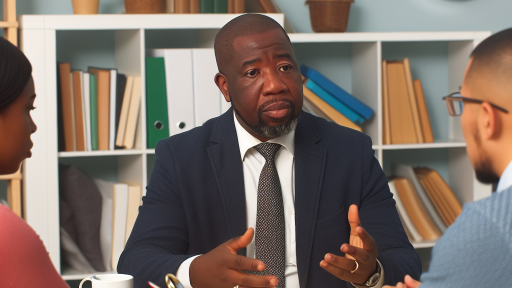Introduction
Conflict is a natural aspect of any marriage.
Couples often disagree due to differing perspectives and expectations.
In Nigeria, cultural, social, and economic factors contribute to these conflicts.
Ignoring these issues can lead to unhealthy relationships and emotional detachment.
Addressing conflict is crucial for fostering a healthy relationship.
When couples learn to resolve their disagreements, they build trust and understanding.
This process helps them grow as individuals and partners.
Effective conflict resolution also prevents resentment from building up over time.
Couples who resolve conflicts often report greater satisfaction in their relationships.
This blog post aims to explore conflict resolution within the context of Nigerian couples.
Nigerian relationships often blend traditional values with modern influences.
As such, effective conflict resolution strategies must consider these unique dynamics.
By understanding the importance of addressing conflicts, couples can enhance their communication skills and emotional intelligence.
This understanding lays the groundwork for healthier interactions.
Engaging in open dialogue during conflicts is essential.
Nigerian couples often face societal expectations that complicate discussions.
They may fear judgment from family or community.
However, creating a safe space for communication can help navigate these challenges.
Couples should practice active listening and empathy.
This encourages each partner to express their feelings without fear of retribution.
Additionally, resolving conflicts strengthens the emotional bond.
When couples work together to overcome disagreement, they create a shared sense of accomplishment.
This collaboration fosters a deeper connection, reinforcing their commitment to one another.
Moreover, couples become role models for effective conflict resolution within their families and communities.
In summary, understanding conflict resolution’s importance is vital for Nigerian couples.
Addressing conflicts leads to healthier, more fulfilling relationships.
By embracing open communication and collaboration, partners can cultivate lasting love and respect.
Understanding Conflict in Nigerian Marriages
Every marriage encounters conflict. Nigerian marriages are no exception.
Understanding the common sources of conflict is essential for resolution.
Many factors contribute to these conflicts.
These include cultural, social, and economic reasons.
Conflicts often arise from differing expectations and roles within the marriage.
Common Sources of Conflict among Nigerian Couples
Cultural differences frequently create tension.
Nigeria is diverse, with over 250 ethnic groups.
These groups have unique customs and beliefs.
When couples come from different backgrounds, misunderstandings arise.
Such differences can spawn conflicts about roles and responsibilities.
- Cultural Expectations: Each partner may have distinct expectations based on their background.
- Social Norms: The influence of family and community can add pressure to the marriage.
- Economic Factors: Financial stress is a common trigger for arguments.
- Gender Roles: Traditional views about the roles men and women should play can lead to disputes.
- Religious Beliefs: Differences in faith can impact decision-making and priorities.
Miscommunication often exacerbates these issues.
Couples may misinterpret each other’s intentions.
This misinterpretation leads to resentment and misunderstanding.
Each partner must strive for clear communication to mitigate this risk.
Open discussions about expectations can bridge gaps in understanding.
The Role of Traditional Relationships and Family Dynamics
Traditional relationships are significant in Nigeria.
Families often play a critical role in marriages.
Parental expectations and family influence can spark conflicts.
When partners feel pressured by their relatives, tension can build.
Each partner’s family dynamics shape their perceptions and reactions.
Some families may interfere more than others, causing further friction.
- Interference from Extended Family: In some cultures, extended families are heavily involved in marital matters.
- Financial Contributions: Expectations around financial support from in-laws can create stress.
- Living Arrangements: Decisions about living with extended family can lead to disagreements.
- Obligations to Family: Balancing spouse’s needs with family obligations can be challenging.
Seeing marriage as a partnership rather than a union of families helps.
Emphasizing this view can reduce conflicts stemming from family interference.
Couples should set clear boundaries with their families.
Open dialogue about family roles helps to ease tension.
How Background and Upbringing Influence Conflict Styles
A partner’s upbringing significantly impacts conflict resolution styles.
Each individual’s background shapes their behavior during disputes.
For instance, some may prioritize emotional expression, while others may suppress feelings.
Understanding these differences is crucial for addressing conflicts.
- Communication Styles: Upbringing influences how one communicates.
It dictates whether someone is assertive or passive. - Handling Emotions: Some individuals might be more emotionally expressive than others.
- Problem-Solving Approaches: Each partner’s approach to problem-solving may vary based on upbringing.
- Conflict Avoidance: Many people learn to avoid conflict as children, which can create problems later.
- Resolution Techniques: Different families teach different techniques for resolving disputes.
Understanding one another’s backgrounds facilitates better conflict resolution.
Couples must take the time to explore their partner’s upbringing.
Discussions about past conflicts and resolutions can provide invaluable insight.
Each partner can learn what triggers their spouse’s responses and why.
To promote harmony in their relationships, couples need to cultivate emotional intelligence.
Being aware of each other’s feelings and reactions fosters mutual respect.
Such awareness encourages empathy and patience during conflicts.
Basically, the importance of understanding conflicts in Nigerian marriages cannot be overstated.
Couples need to recognize the sources of their disagreements.
They should be mindful of the roles family dynamics play.
Additionally, they must consider how their backgrounds shape their reactions.
These components will help couples navigate conflicts more effectively.
Healthy conflict resolution contributes to strong marriages.
By resolving disagreements, couples strengthen their bond.
Each conflict presents an opportunity for growth.
With a focus on communication and understanding, Nigerian couples can thrive.
Together, they can build a relationship founded on trust and respect.
Cultural Perspectives on Conflict Resolution
Nigeria hosts a diverse array of ethnic groups and cultures, each with unique approaches to conflict resolution.
Understanding these cultural perspectives is vital for Nigerian couples navigating their relationships.
These perspectives shape how couples communicate, resolve differences, and maintain harmony.
The Significance of Communal Values in Nigerian Culture
Communal values play an essential role in Nigerian culture.
Families and communities prioritize collective well-being, which influences conflict resolution.
Here are some key aspects:
- Family Bonds: Family is central to Nigerian society.
Conflicts often involve extended family dynamics. - Community Influence: The community often intervenes in disputes, reflecting a shared responsibility for harmony.
- Cultural Norms: Respect for tradition guides conflict resolution.
Couples often adhere to established practices. - Social Support: Community members provide support during conflicts, reinforcing bonds and easing tensions.
These communal values encourage cooperation and compromise among couples.
When disagreements arise, partners often focus on the larger family or community’s interests, rather than individual grievances.
This perspective fosters a sense of unity, helping couples navigate conflicts with empathy and understanding.
Traditional Approaches to Resolving Disputes
Nigeria boasts rich traditions for resolving disputes.
These methods often stem from cultural beliefs and customs passed down through generations.
Here are some prevalent traditional approaches:
- Mediation by Elders: Elders often mediate disputes, using their wisdom to guide couples toward resolution.
- Cultural Rituals: Rituals may accompany conflict resolution, symbolizing purification and reconciliation.
- Community Meetings: Communities often hold gatherings to address conflicts, allowing multiple perspectives to be heard.
- Negotiation: Couples engage in negotiation, seeking compromises that honor both partners’ values.
These traditional approaches emphasize respect, patience, and healing.
They often prioritize restoring relationships over assigning blame.
Couples benefit from these practices as they foster open communication and collaboration.
Contrasts between Modern Methods and Traditional Values
Modern conflict resolution methods contrast significantly with traditional values in Nigeria.
Modern approaches tend to focus on individual rights and assertiveness.
In contrast, traditional methods emphasize communal harmony and respect.
Here are some notable differences:
- Individualism vs. Collectivism: Modern methods promote individual expression, while traditional methods value collective interests.
- Direct Communication vs. Indirect Approaches: Modern techniques often encourage direct discussions.
Traditional practices may involve indirect communication to preserve harmony. - Formal Mediation vs. Informal Resolution: Modern conflict resolution may involve legal proceedings.
Traditional methods rely on informal community rituals and discussions. - Focus on Solutions vs. Relationship Restoration: Modern approaches prioritize solutions, while traditional methods emphasize preserving relationships.
These contrasts create challenges for Nigerian couples navigating conflict.
Those raised in traditional settings might struggle with modern approaches that prioritize individual assertions.
Conversely, couples with modern influences might find traditional methods restrictive or inadequate.
Despite these differences, couples can benefit from combining both approaches.
By integrating traditional values with modern techniques, couples can find effective conflict resolutions that resonate with their cultural backgrounds while safeguarding their relationships.
The Role of Communication in Conflict Resolution
Effective communication lies at the heart of conflict resolution.
Both traditional and modern approaches emphasize its importance.
Couples who communicate well can navigate conflicts more effectively.
Look at some key communication strategies:
- Active Listening: Listening attentively to each other fosters understanding and reduces miscommunication.
- Expressing Feelings: Sharing feelings helps partners understand each other’s perspectives and emotional triggers.
- Avoiding Blame: Focusing on behaviors rather than personal attacks maintains respect and minimizes defensiveness.
- Seeking Common Ground: Finding shared values and interests can bridge gaps during disagreements.
Implementing these strategies enhances communication flow between couples.
By making communication a priority, couples can address issues before they escalate into more significant conflicts.
Understanding cultural perspectives on conflict resolution is crucial for Nigerian couples.
Communal values, traditional approaches, and modern methods all contribute to how couples address disagreements.
By considering these cultural perspectives, couples can develop effective strategies for navigating conflicts.
Ultimately, blending traditional values with modern practices can enhance relationship satisfaction and harmony for Nigerian couples.
Emphasizing respect, communication, and collaboration ensures that conflicts are resolved in ways that honor both partners and strengthen their bond.
Read: How Nigerian Couples Can Build Emotional Intimacy in Marriage
The Psychological Impact of Unresolved Conflict
Conflict is a natural part of any relationship.
However, unresolved conflict can deeply affect couples in negative ways.
Nigerian couples often experience unique challenges due to cultural expectations and social norms.
Understanding the psychological impact of unresolved conflict is essential for fostering healthier relationships.
Emotional Consequences for Couples
Couples who do not resolve conflicts often suffer emotionally.
The persistent presence of these conflicts breeds resentment and frustration:
- Increased Anxiety: Unresolved issues can lead to persistent anxiety.
Couples may feel ongoing tension in their relationship. - Lowered Self-Esteem: Constant conflict can erode one’s self-worth. Individuals may feel inadequate or unlovable.
- Emotional Distress: Couples may experience sadness, anger, or frustration.
Unaddressed issues contribute to these negative feelings. - Isolation: Unresolved conflict can lead to social withdrawal.
Couples may distance themselves from friends and family. - Loss of Intimacy: Emotional disconnect can reduce physical and emotional intimacy.
This creates a cycle of further conflict.
These emotional consequences can lead to a downward spiral in the relationship.
Without resolution, couples may find themselves trapped in negative patterns of behavior.
Effects on Children and Family Structure
The impact of unresolved conflict extends beyond couples.
Children in these environments often bear the burden of their parents’ issues.
The effects of such conflicts can manifest in various ways:
- Behavioral Issues: Children may exhibit aggression or withdrawal.
They often mirror the unresolved emotions of their parents. - Academic Struggles: Emotional turmoil at home can distract children from their studies.
This leads to poor academic performance. - Relationship Challenges: Children raised in conflict-prone homes may struggle in their relationships.
They might replicate the same patterns they witnessed. - Emotional Instability: Growing up in a tense environment can lead to anxiety and depression in children.
They often internalize the conflicts. - Conflicted Loyalty: Children may feel torn between parents.
This conflict of interest weighs heavily on their emotional well-being.
The ripple effects of unresolved conflict can disrupt the entire family structure.
Adults must recognize how their issues affect their children.
Case Studies and Anecdotes
Real-life examples illustrate the significant impact of unresolved conflicts.
These anecdotes reveal the emotional turmoil experienced by couples and families:
- Case Study 1: A couple in Lagos struggled with financial disagreements.
Over time, their inability to communicate led to heightened tensions.
Their children started exhibiting aggression towards classmates and withdrawn behavior at home. - Case Study 2: In Ibadan, a couple drifted apart after several unresolved conflicts.
They stopped showing affection towards each other.
Both their children began to exhibit academic struggles, mirroring their parents’ emotional distress. - Case Study 3: A woman from Port Harcourt dealt with unresolved arguments about parenting.
She felt isolated, withdrawing from social connections.
Her children, sensing the emotional imbalance, displayed uncertainty in their own friendships. - Anecdote 1: A husband and wife from Abuja argued frequently about household responsibilities.
This conflict festered for months, leading to bitterness.
Their children began to copy their disdain for conflict resolution, leading to escalated tensions in their own relationships.
These cases exemplify the real-world consequences faced by couples who do not prioritize conflict resolution.
They showcase how emotional struggles can manifest in various distressing ways.
Strategies for Conflict Resolution
Navigating unresolved conflicts requires commitment and effort.
Couples can adopt several strategies to enhance their resolution process:
- Effective Communication: Open, honest dialogue allows both partners to express their feelings.
This approach fosters understanding and empathy. - Active Listening: Partners must listen actively without interrupting.
This practice shows respect and acknowledges each other’s perspectives. - Seeking Compromise: Couples should strive for solutions that satisfy both individuals.
Finding a middle ground strengthens the relationship. - Professional Guidance: Sometimes, seeking help from a therapist can offer new perspectives.
A neutral party can facilitate productive conversations. - Emotional Check-ins: Regularly checking in with one another helps identify brewing issues before they escalate.
This practice encourages ongoing emotional connection.
By implementing these strategies, couples can begin to address and resolve their conflicts.
They can safeguard their emotional health and the well-being of their children.
The psychological impacts of unresolved conflict in relationships extend beyond the individuals involved.
Nigerian couples face cultural and social complexities that necessitate a deeper understanding of conflict resolution.
Prioritizing effective resolution strategies can significantly improve emotional health and family dynamics.
Fostering a loving and respectful environment is paramount for couples.
Resolving conflicts not only benefits the partners themselves but also creates a supportive space for their children.
As such, making conflict resolution a priority can lead to healthier, happier families.
Read: Strengthen Your Marriage with These Communication Tactics in Nigeria

Effective Communication Strategies for Conflict Resolution
Conflict is a natural part of any relationship, including those among Nigerian couples.
Disagreements often arise due to cultural differences, personal expectations, or external pressures.
Thus, effective communication strategies become vital.
Utilizing effective communication can lead to resolution, understanding, and growth as a couple.
Importance of Open Dialogue and Active Listening
Open dialogue serves as the foundation for resolving conflicts in any relationship.
It encourages both partners to express their feelings, thoughts, and concerns freely.
Couples who practice open dialogue experience several benefits:
- Facilitates Understanding: When both partners share their perspectives, they enhance understanding, which reduces frustration.
- Builds Trust: Open communication fosters trust between partners, allowing them to be vulnerable without fear of judgment.
- Encourages Emotional Expression: Couples can express their emotions, making it easier to address and resolve conflicts.
Similarly, active listening plays an essential role in conflict resolution.
It involves fully concentrating on what your partner says without preemptively judging or responding.
Active listening includes:
- Giving Full Attention: Show your partner that they matter by listening without distractions.
- Validating Feelings: Acknowledge your partner’s feelings by repeating back what you heard them say.
- Asking Clarifying Questions: Encourage deeper understanding by asking questions about the thoughts and feelings shared.
These strategies create a safe space, enabling both partners to voice their needs.
Such openness often results in a more harmonious relationship.
Techniques for Approaching Difficult Conversations
Conflict often involves difficult conversations.
Utilizing effective techniques can help couples navigate these conversations with grace and understanding.
Below are essential strategies:
- Use ‘I’ Statements: Utilizing ‘I’ statements allows couples to express their feelings without sounding accusatory.
For example, say, “I feel hurt when…” instead of “You always ignore me.” - Avoid Blame: Avoiding blame helps keep the conversation constructive.
Instead of blaming your partner, focus on how the situation affects you. - Stay on Topic: Address only the issue at hand and avoid bringing up past conflicts.
Staying focused prevents escalation. - Practice Empathy: Endeavor to understand situations from your partner’s perspective.
This practice nurtures deeper emotional connections. - Set Time Limits: Agree on a time frame for discussions to avoid prolonged conflicts.
This strategy encourages efficiency in addressing issues.
When couples implement these techniques, they create an atmosphere conducive to discussion.
Difficult conversations can transform into opportunities for growth and understanding.
The goal should not be to win the argument but to find a mutually agreeable resolution.
Cultural Considerations When Communicating Grievances in Nigerian Contexts
Nigeria is culturally diverse, and couples must recognize these differences when communicating grievances.
Understanding cultural dynamics can greatly enhance conflict resolution.
Consider the following cultural aspects:
- Respect for Elders: In many Nigerian cultures, respect for elders plays a critical role.
Recognizing this can help frame conversations in a respectful manner. - Indirect Communication Styles: Some Nigerian cultures favor indirect communication, where criticism may be veiled.
Couples should interpret these nuances correctly. - Role of Community: Community opinions can influence relationship dynamics.
Recognizing this influence can help couples navigate conflicts with greater sensitivity. - Gender Roles: Traditional gender roles often prevail in Nigerian marriages.
Acknowledging these roles can facilitate better understanding during conflicts. - Spiritual Involvement: Religious beliefs often impact relationship dynamics.
Discussing grievances with consideration for spiritual beliefs can foster mutual respect.
Couples who embrace their cultural context can communicate more effectively.
Each party should strive to understand how their background influences their perspectives.
Conflict resolution is paramount for the health and longevity of Nigerian couples’ relationships.
Implementing effective communication strategies can yield positive outcomes.
Open dialogue and active listening pave the way for understanding and connection.
Approaching difficult conversations with specific techniques makes resolution feasible.
Finally, recognizing cultural considerations deepens empathy and enhances communication.
By embracing these strategies, couples can transform their relationships and foster a nurturing environment.
Ultimately, love, patience, and understanding become the pillars upon which lasting relationships stand.
Read: Building Strong Relationships in Nigerian Marriages
Professional Help and Mediation
Conflict is a natural part of any relationship, especially in marriage.
Nigerian couples, like others, can face challenges that sometimes become overwhelming.
Recognizing when to seek professional help is essential for maintaining a healthy relationship.
When to seek help from marriage counselors or relationship experts
Identifying when to reach out for professional assistance can significantly enhance a couple’s journey toward resolution.
Here are some indicators that couples might need outside help:
- Escalating Arguments: If disputes frequently escalate and become heated, it’s time to seek help.
- Communication Breakdown: When communication fails, and partners feel unheard, professional guidance is crucial.
- Emotional Distress: Ongoing feelings of anger, sadness, or frustration can signal the need for intervention.
- Repeated Patterns: If conflicts recur in similar patterns, it may indicate deeper issues requiring external support.
- Unresolved Issues: When issues linger unresolved, professional help can facilitate effective conflict resolution.
- External Stressors: Factors such as financial stress or family dynamics can strain a marriage, necessitating counseling.
Seeking help from marriage counselors or relationship experts can provide a neutral ground.
Trained professionals can offer valuable insights and tools for effective communication.
They also facilitate deeper understanding and help couples explore their feelings and perspectives.
Benefits and limitations of mediation in conflict resolution
Mediation can serve as an effective means of resolving conflicts.
However, couples should understand both its advantages and limitations:
Benefits of Mediation
- Neutral Ground: Mediators provide a neutral space where both partners can express themselves.
- Enhanced Communication: Mediation promotes open, honest conversations about issues affecting the marriage.
- Empowerment: Couples feel empowered as they explore solutions together rather than through confrontation.
- Confidentiality: Mediation processes are typically confidential, encouraging transparency.
- Cost-Effective: Mediation can be less expensive than traditional therapy and can resolve issues quicker.
- Collaborative Solutions: It fosters collaborative problem-solving, resulting in mutually beneficial outcomes.
Limitations of Mediation
- Not Always Effective: If one partner refuses to participate, mediation may not yield results.
- Power Imbalances: Power dynamics can overshadow discussions, leading to unbalanced resolutions.
- Lack of Authority: Mediators cannot enforce decisions, making it essential for both parties to agree.
- May Not Address Deep-Seated Issues: When issues are deeply entrenched, mediation might not be sufficient.
- Requires Willingness: Both parties must be willing to engage sincerely for mediation to work.
- Emotionally Charged Situations: Highly emotional situations might require more intensive therapy.
Understanding both the benefits and limitations of mediation allows couples to choose the right path for their situation.
With a willingness to engage and communicate, many couples can find resolution through mediation.
Availability of resources and programs focused on marriage support in Nigeria
Nigeria offers various resources and programs dedicated to marriage support.
Couples seeking assistance can explore several avenues:
- Marriage Counseling Services: Numerous organizations provide counseling services tailored for couples.
- Community Workshops: Institutions often host workshops focusing on conflict resolution skills for couples.
- Online Counseling: Virtual therapy options have emerged, making counseling accessible anywhere.
- Religious Institutions: Many churches and mosques offer marriage counseling and educational programs.
- Government Initiatives: Some government programs aim to support family health and stability.
- Non-Governmental Organizations: NGOs often run programs addressing marital challenges and providing resources.
In addition to these resources, couples can find self-help books and online platforms that provide guidance on conflict resolution.
These tools can empower couples to develop their skills independently.
Professional help and mediation offer valuable avenues for Nigerian couples addressing conflicts.
By recognizing when to seek assistance, understanding the benefits and limitations of mediation, and utilizing available resources, couples can enhance their relationships.
They can create a supportive, loving environment even amidst challenges.
Conflict resolution is an essential skill that every couple should prioritize.
Through intentional efforts and the right support, many couples can transform conflicts into opportunities for growth.
This journey ultimately strengthens their bond and deepens their understanding of one another.
Read: Avoiding Marriage Fraud: Tips for Genuine US Weddings
Building a Stronger Relationship Through Conflict
Conflict is inevitable in any relationship, including marriage.
Nigerian couples face unique challenges rooted in cultural expectations and societal pressures.
Understanding how to resolve these conflicts can significantly strengthen a relationship.
When couples address conflicts, they pave the way for enhanced intimacy and trust.
Enhancing Intimacy and Trust
Conflict resolution plays a crucial role in enhancing intimacy and trust.
Here are several ways how resolving conflict can foster a deeper bond:
- Openness: Couples who resolve conflicts openly create a safe space for sharing feelings.
This transparency fosters intimacy. - Shared Understanding: Resolving differences encourages partners to understand each other’s perspectives.
This understanding strengthens their emotional connection. - Improved Communication: Successful conflict resolution requires effective communication.
Couples develop better communication skills, which benefits the relationship. - Increased Trust: When couples address issues, they build a foundation of trust.
Knowing that both partners can handle conflicts solidifies their commitment. - Emotional Growth: Navigating through conflicts encourages personal and relational growth.
Couples learn valuable life lessons that enhance their bond.
The Role of Forgiveness and Empathy in Healing
Forgiveness and empathy are essential components of conflict resolution.
They help heal wounds and foster a healthy relationship.
Understanding these concepts can be transformative for Nigerian couples.
- Forgiveness: Forgiving each other is crucial for moving forward.
Holding onto grudges creates emotional distance between partners. - Empathy: Practicing empathy allows partners to grasp each other’s feelings.
When couples empathize, they can address underlying issues more effectively. - Mutual Understanding: Both forgiveness and empathy encourage open-hearted communication.
These qualities promote dialogue that leads to solutions. - Strengthening Bonds: Working through forgiveness and empathy enhances emotional intimacy.
Couples emerge from conflicts with a stronger connection. - Creating a Positive Atmosphere: An atmosphere of forgiveness promotes love and understanding.
Couples feel more secure when they believe their partner can forgive them.
Steps Couples Can Take to Grow Together Post-Conflict Resolution
After resolving conflicts, couples should actively work on strengthening their relationship.
Here are steps that can help Nigerian couples grow together:
- Reflect Together: Take time to reflect on the conflict.
Discuss what worked and what could improve for future situations. - Express Gratitude: Acknowledge each other’s efforts in resolving the conflict.
Expressing gratitude strengthens emotional bonds. - Set Future Goals: Work together to set relationship goals.
These goals can focus on improving communication or enhancing intimacy. - Engage in Quality Time: Spend quality time together.
Engaging in enjoyable activities helps reignite the spark in the relationship. - Practice Open Dialogue: Maintain an open dialogue even after resolution.
Regular communication helps prevent future misunderstandings. - Implement Conflict Resolution Strategies: Discuss and agree on strategies that both partners can use in future conflicts.
This proactive approach can eliminate misunderstandings. - Celebrate Progress: Celebrate the progress you make as a couple.
Recognizing achievements together reinforces the idea that you are a team. - Seek Professional Help: If necessary, don’t hesitate to seek the guidance of a relationship expert.
Professional insights can provide invaluable support.
By embracing conflict resolution, couples can fortify their relationships.
They can foster a deeper understanding and trust through openness and vulnerability.
Remember, it’s not about avoiding conflict; it’s about how you handle it.
When couples learn to resolve conflicts, they unlock a path to relational growth.
This growth ultimately leads to a richer and more fulfilling partnership.
Conclusion
Conflict resolution is vital for Nigerian couples.
It fosters understanding and strengthens partnerships.
Resolving conflicts enhances communication and prevents misunderstandings.
When couples engage in healthy conflict resolution, they create a safe space for expressing feelings.
Conflict can often seem daunting.
However, viewing it as a growth opportunity can change your perspective.
It allows couples to learn more about each other’s needs and values.
Embracing differences can lead to deeper connections between partners.
Navigating conflicts effectively encourages mutual respect and empathy.
Couples should learn to listen actively and express themselves clearly.
This approach helps in addressing issues before they escalate.
Healthy discussions can pave the way for long-lasting solutions.
Furthermore, conflict resolution strengthens trust between partners.
When both individuals feel heard, they are more likely to open up.
Openness creates an environment where both partners feel valued and appreciated.
Establishing trust becomes crucial for a thriving relationship.
Moreover, mastering conflict resolution techniques contributes to emotional stability.
Couples who manage disagreements well are generally happier.
They experience less stress and more satisfaction in their relationships.
This happiness radiates into various aspects of their lives.
Ultimately, effective conflict resolution can lead to healthier relationships.
It promotes a sense of teamwork and collaboration in facing challenges.
By working together, couples can overcome obstacles and grow stronger.
In general, Nigerian couples must prioritize conflict resolution.
By approaching conflicts constructively, they can turn challenges into opportunities.
This proactive mindset fosters healthier, more resilient relationships that stand the test of time.




